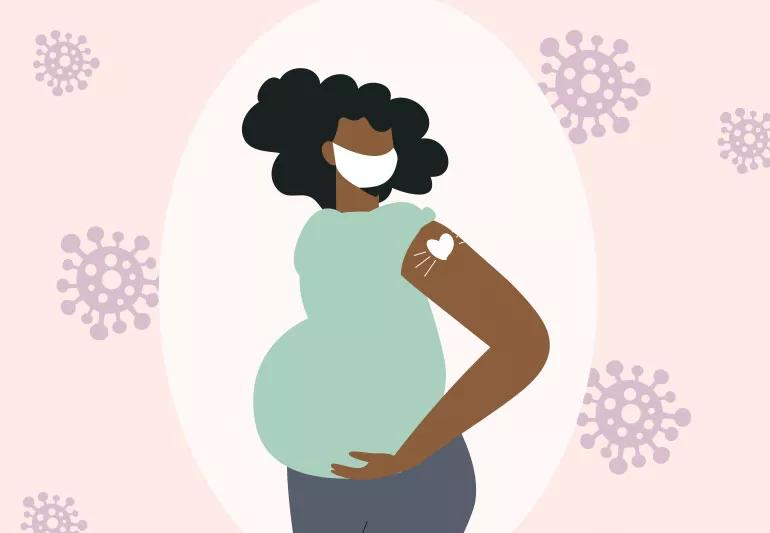An expert lays out why people who are pregnant should get vaccinated, as well as get their boosters

Image content: This image is available to view online.
View image online (https://assets.clevelandclinic.org/transform/7e6469b5-4dd4-495b-870f-976422700e54/wmnPregnantBooster-1318852282-770x533-1_jpg)
pregnant woman with COVID booster shot
With the COVID-19 pandemic showing no signs of slowing down after two years, the focus has turned to vaccines and vaccine boosters for eligible people, including people who are pregnant.
Advertisement
Cleveland Clinic is a non-profit academic medical center. Advertising on our site helps support our mission. We do not endorse non-Cleveland Clinic products or services. Policy
While we know that the COVID-19 vaccines are safe for people who are pregnant, what about booster shots?
According to Ob/Gyn Oluwatosin Goje, MD, the COVID-19 vaccine boosters are absolutely safe for people who are pregnant. Dr. Goje detailed further details about what people who are pregnant should know about getting their booster shot.
In the fall of 2021, the Food and Drug Administration (FDA) issued an Emergency Use Authorization (EUA) that allows adults to receive any available COVID-19 vaccine as their booster shot regardless of which vaccine (Pfizer, Moderna or Johnson & Johnson) they received for their initial vaccination.
This extends to people who are pregnant, too, says Dr. Goje. “On December 17, 2021, the CDC advised that either of the mRNA vaccines — Pfizer or Moderna — were preferable for a booster shot, especially with the Omicron variant,” she says.
If neither of those vaccines is available, though, the Johnson & Johnson vaccine is still safe to receive as a booster.
“Vaccines wane over time so by receiving the booster, you’re improving immunity for both yourself and the fetus,” says Dr. Goje. “You’re doing yourself and your child a favor by getting the booster.”
Even if you’re not pregnant, Dr. Goje says you should still get the booster if you plan on trying to conceive in the future.
Advertisement
People who are pregnant are no more likely to feel side effects than others, says Dr. Goje. “Most people experience side effects with their booster that’s similar to side effects they had with their original vaccination,” she notes. “It’s mostly been body aches fatigue, some soreness, some fever and headaches.”
Just as with the side effects from the vaccinations, there aren’t any risks to either people who are pregnant or their children from the side effects of the booster shot. Just be sure to stay properly hydrated.
Dr. Goje also says that taking acetaminophen (Tylenol®) is safe to take for the aches and pains from any side effects. “We don’t recommend ibuprofen in pregnancy but acetaminophen and, if necessary, antinausea medicine is safe,” she says
Both the American College of Obstetricians and Gynecologists (ACOG) and the American Society for Reproductive Medicine (ASRM) have recommended people who are pregnant or breastfeeding should get a booster shot.
Data from recent studies indicate that people who are pregnant or breastfeeding who received the vaccine passed it on to their babies via the placenta and breast milk. While there’s more research to be done, these results underscore more potential benefits for getting vaccinated and receiving a booster shot.
If you have any questions, Dr. Goje adds, reach out to your healthcare provider.
Just as with vaccinations, boosters are essential in protecting both people who are pregnant and their fetus, says Dr. Goje. “A majority of pregnant patients who are currently hospitalized are unvaccinated,” she says. “Vaccines work and save lives.”
Advertisement

Delivered every Tuesday!
Sign up for our Health Essentials emails for expert guidance on nutrition, fitness, sleep, skin care and more.
Learn more about our editorial process.
Advertisement
Children as young as 6 months should get vaccinated
Despite what you’ve heard or hoped, no one is 100% protected
Fatigue, mood swings and poor concentration are key symptoms
Just one more myth to add to the misinformation pile
Talk with them about their new sibling early and often
Dental care is not only safe during pregnancy, but it’s also highly recommended
A healthy pregnancy diet includes good amounts of folic acid, DHA, calcium and more
If left untreated, you risk complications, early labor and passing the infection to your baby
Type 2 diabetes isn’t inevitable with these dietary changes
Applying a hot or cold compress can help with pain
Pump up your iron intake with foods like tuna, tofu and turkey